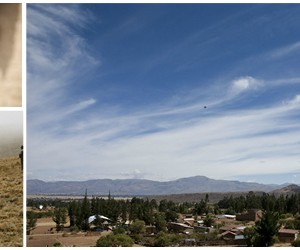Federal Water Tap, July 16: Climate Change and U.S. Agriculture
Climate change will have the greatest economic effect on crops in the Midwest’s Corn Belt states, where annual loses could range from US$1.1 billion to US$4.1 billion by 2030. The U.S. Department of Agriculture’s Economic Research Service used four climate projections, a crop-growth simulation, and a model for predicting how farmers would change their crop selection based on market prices and crop productivity.
The study found significant variation in both regions and climate projections, largely because of uncertainty about precipitation. The models could not account for the effects of more extreme weather events.
Fuel Flip
Natural gas is overtaking coal, and carbon emissions are dropping because of it. The Energy Information Administration (EIA), an energy research agency funded by Congress, shows this in a graph released last week. The two main fossil fuel sources for electric generation have a near-even split of the pie. As a result, U.S. carbon emissions were below 1996-levels last year, and could drop below 1990-levels this year, according to the EIA.
Nevada Pipeline
The Bureau of Reclamation added a sixth option to its environmental review of a proposed pipeline to carry groundwater from basins in northern Nevada to the Las Vegas area. The bureau is mulling whether to grant the Southern Nevada Water Authority permission to construct the pipeline on federal lands. A decision is expected next month.
Moving Along
The House Agriculture Committee approved its version of the Farm Bill. House leaders have not said when they will bring the bill before the full House. The New York Times reports that such a vote might be delayed until after the November elections.
Hot, Wet, Nasty
Scarcely past the halfway mark, the year 2012 has already re-written tens of thousands of daily temperature records in the U.S. and has proven to be the hottest January-June period ever in the contiguous 48 states, according to the National Oceanic and Atmospheric Administration (NOAA).
Lest we forgot the very recent past, NOAA has just released the State of the Climate in 2011, a global review. Last year’s La Nina brought historic drought to eastern Africa and the southern U.S., while Australia soaked up its third-wettest year on record.
Funding for Energy Research and Conservation
In February, President Obama designated US$30 million for research into using natural gas as a fuel for cars and trucks. Last week, the Department of Energy announced that 13 projects have been selected, many of which will focus on developing light-weight fuel tanks and gas compressors for at-home refueling.
The Obama administration also announced US$80 million for restoration projects in the Everglades, the National Park with the highest number miles of polluted streams, as defined by the Clean Water Act. The National Park Service recently updated its statistics on Clean Water Act violations for each park.
Carp
An amendment to the House and Senate highway funding bills will require the Army Corps of Engineers to speed up the timeline for completing a study on how to prevent aquatic invasive species, especially the voracious Asian carp, from moving between the Mississippi River Basin and the Great Lakes.
A separate study conducted by national science agencies in Canada and the U.S. looked at the ecological risks to the Great Lakes from several nonnative carp species. The study found that the carp could survive and thrive in the Lakes and compete with established species for food. The greatest risks are to lakes Michigan, Huron and Erie.
Federal Water Tap is a weekly digest spotting trends in U.S. government water policy. To get more water news, follow Circle of Blue on Twitter and sign up for our newsletter.
Brett writes about agriculture, energy, infrastructure, and the politics and economics of water in the United States. He also writes the Federal Water Tap, Circle of Blue’s weekly digest of U.S. government water news. He is the winner of two Society of Environmental Journalists reporting awards, one of the top honors in American environmental journalism: first place for explanatory reporting for a series on septic system pollution in the United States(2016) and third place for beat reporting in a small market (2014). He received the Sierra Club’s Distinguished Service Award in 2018. Brett lives in Seattle, where he hikes the mountains and bakes pies. Contact Brett Walton






Leave a Reply
Want to join the discussion?Feel free to contribute!